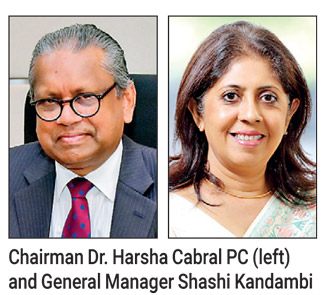Sunday Feb 22, 2026
Sunday Feb 22, 2026
Tuesday, 27 August 2024 02:51 - - {{hitsCtrl.values.hits}}
 National Savings Bank said yesterday it has already surpassed the previous year’s profit after Tax (PAT) by the second quarter of this year.
National Savings Bank said yesterday it has already surpassed the previous year’s profit after Tax (PAT) by the second quarter of this year.
The bank registered a PBT of Rs. 15 billion for the six months period of year 2024 whereas the PAT for the year 2023 was Rs. 7.21 billion.
NSB Chairman Dr. Harsha Cabral PC said: “Our strong profitability in the first six months of this year is a testament to the strategic focus of our corporate management, the dedication and hard work of our employees, and the emerging economic stabilisation following the recent crisis. Despite the challenging environment, our team has remained resilient, and together we have successfully navigated the complexities of the market. This collective effort has positioned the bank to not only recover but also thrive in the post-crisis landscape.”
General Manager Shashi Kandambi, commenting on the increased profitability said: “ Our net interest income saw a significant boost, primarily driven by our optimal treasury operations and exemplary liquidity management. All key performance indicators of the Bank have shown improvement, reflecting the increased profitability supported by economic stabilisation and the favourable impact of the declining interest rate environment. Our strong financial performance reinforces our role in contributing to the nation’s recovery and growth, staying true to the core mission of the bank.”
Despite ongoing reductions in policy interest rates, the bank benefited from liabilities being repriced at a lower cost. Although interest income for the first six months declined by 7% to Rs. 103 billion, interest expenses also dropped by 29% to Rs. 71 billion. This positive effect led to a 170% increase in Net Interest Income compared to the same period last year, reaching Rs. 32.5 billion.
Fee and commission income rose by 55%, mainly due to increased fees and commissions from cards, mobile app transactions and internet banking transactions compared to same period last year. The net gain on derecognition from financial assets at fair value through other comprehensive income skyrocketed by 543%, fuelled by realised gains from Treasury bonds and Treasury bills amounting to Rs. 442 million. Operating expenses increased by 32%, mainly due to the increase in salary costs from the 2024-2026 collective agreement, while other expenses grew by 9%, mirroring global inflationary pressures.
The asset quality of the bank improved mainly due to positive effects of economic recovery and declining interest rates which have strengthened the financial position of borrowers previously impacted by repeated crises, allowing them to resume their loan repayments and stronger recovery actions taken by the bank. Accordingly, the bank reported an Impaired Loans (Stage 3) Ratio (net of Stage 3 impairment) and Impairment (Stage 3) to Stage 3 Loans Ratio of 2.50% and 53.54% respectively demonstrating the bank’s financial resilience and prudent management of credit risk. These strategic measures have contributed to an improved bottom line, underscoring the bank’s commitment to maintaining stability even in challenging economic conditions.
A drastic improvement was shown in operating profit before tax which was Rs. 20.11 billion in the reporting period whereas last year same period reported a Rs. 581 million. A 360-degree turnaround was materialized with positive market conditions and tremendous dedication and collaboration. The bank paid Rs. 11.2 billion in taxes to the Government during the first half of the year, including Value Added Tax (VAT) on financial services, Social Security Contribution Levy (SSCL) on financial services, and Income Tax.
Key Performance Indicators
Profitability metrics significantly improved in the first half of the year compared to the end of 2023. Net Interest Margin (NIM) increased by 207 basis points to 3.86%, while Return on Assets (ROA) and Return on Equity (ROE) were 1.78% and 20.74%, respectively, reflecting rises of 152 basis points and 1,138 basis points. This substantial growth was achieved through strategic decisions made at the optimal times.
The Regulatory Liquidity Coverage Ratio (Rupee), Liquidity Coverage Ratio (All Currency), and Net Stable Funding Ratio were significantly above the regulatory minimum requirement of 100%, standing at 318.64%, 314.37%, and 184.18%, respectively. By the end of 2Q2024, the Tier I and Total Capital Adequacy Ratios were at 18.10% and 20.84%, both comfortably exceeding the regulatory minimum levels of 8.5% and 12.5%, respectively.